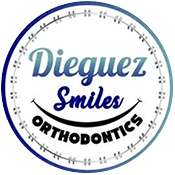Dieguez Smiles Orthodontics FAQs
- Free Consultations
- Custom Payment Plans
- Hablamos Español
Hours:
Dieguez Smiles Orthodontics FAQ
Have an orthodontics-related question? Dieguez Smiles Orthodontics has the answer. Check out these FAQs and give us a call today for more information!
-
What is orthodontics?
Orthodontics, also known as dentofacial orthopedics, is a field of dentistry that improves the appearance through diagnosis, prevention, and treatment of dental and facial abnormalities. Treatment ranges from straightening misaligned teeth to corrective jaw surgeries.
-
Who is an orthodontist?
An orthodontist is a dental specialist who receives two to three years of additional training after their dental degree.
-
What is the best age to visit the orthodontist?
Orthodontic treatments are provided to patients of all ages! No matter how old you are, you can visit the orthodontist when you're looking to improve the look and feel of your smile.
-
Will my teeth straighten as I grow?
No, the space available for the front teeth typically decreases with age, especially after permanent molars come in.
-
How do I schedule an appointment for an initial exam?
Simply give us a call or send us an email and our team will be happy to schedule your appointment with Dr. Dieguez. We will request some basic information in order to set up your appointment.
-
What happens at my initial exam?
We'll ask for your new patient forms and insurance card. Our orthodontist will then complete a thorough clinical exam, which can include X-rays or photographs.
-
What will I learn from the exam?
We'll help you understand if you have an orthodontic problem and what it is, how to correct the problem, if any teeth need to be removed, how long treatment will take, and how much your treatment will cost.
-
How often will I have orthodontist appointments?
The frequency of your visits is dependent upon your needs. Patients are typically seen every four to eight weeks.
-
What are braces?
Braces are an orthodontic appliance used to correct misaligned teeth and bad bites as well as improve the appearance of your smile. There are many types of braces, ranging from traditional braces to clear aligners.
-
How long will I have to wear braces?
The length of time you'll wear braces depends on your individual needs. Every smile responds to treatment differently due to a number of factors, including how quickly your teeth move, the growth of your jaw and face, and the type of braces you're using. On average, treatments take about 24 months.
-
Do I need teeth removed to wear braces?
Not always. While removing teeth is sometimes necessary, new technology and advances in orthodontic procedures can sometimes help to straighten teeth and have a balanced facial profile without the need to remove any teeth.
-
Do braces hurt?
You may feel small amounts of discomfort for the first few days after your braces are installed or after an adjustment, but braces should never hurt. If you're experiencing high levels of pain, please contact our office.
-
How do I care for my teeth while wearing braces?
Practice good oral hygiene and avoid foods and drinks that can damage your braces. You should:
- Brush your teeth after every meal and floss at least once a day
- Avoid sugary drinks and sticky, chewy, and hard foods or any food that can get stuck in your braces
- Receive regular dental cleanings from your dentist
-
Do I still need dental checkups while I wear braces?
Yes. Since your braces and appliances cover so much of your mouth, it can be easy for cavities and tooth decay to develop. Dental cleanings and exams are more important than ever now that you're wearing braces!
-
Should I brush my teeth more often while wearing braces?
Brush your teeth after every meal or three times a day while wearing braces, and floss at least once a day. The orthodontist will explain the proper way to brush and floss with braces.
-
Will braces interfere with my daily activities?
Wearing braces will not stop you from participating in any of your normal activities, including sports. If you play a contact sport, we recommend you get fitted for a custom mouth guard to protect your teeth, soft tissues, and appliances.
-
Can I wear braces if I have crowns and missing teeth?
Yes! Teeth with crowns move the same way as your natural teeth. If you're missing teeth, orthodontic treatment can help to align your remaining teeth to provide you with a healthy bite and smile.
-
How do I take care of my retainer?
A removable retainer should be kept in a container while you eat so that it doesn't get lost or broken. Keep it clean by brushing it with a gentle toothbrush and toothpaste or soaking it in denture cleaner. Do not put your retainer in boiling water, bleach, or the dishwasher.
-
What is Phase One for early treatment?
Phase One treatment is the first stage of orthodontic treatment for children. The orthodontist may recommend early treatments if she thinks there will be significant issues later. Phase One treatments typically last 6-18 months and are designed to ensure teeth and jaws grow and develop as they should.
-
Will my child need braces after Phase One treatment?
Most likely. Between Phase One and braces, there will be a resting period in which your child's teeth and growth will be carefully monitored. The orthodontist will keep you informed about the development of your child's oral health and recommend the appropriate treatments.

Share On: